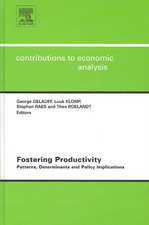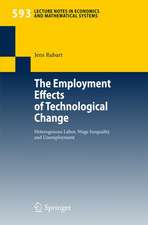Social Insurance, Informality, and Labor Markets: How to Protect Workers While Creating Good Jobs
Editat de Markus Frölich, David Kaplan, Carmen Pagés, Jamele Rigolini, David Robalinoen Limba Engleză Hardback – 3 dec 2014
Preț: 472.78 lei
Preț vechi: 861.25 lei
-45% Nou
Puncte Express: 709
Preț estimativ în valută:
90.46€ • 94.79$ • 74.79£
90.46€ • 94.79$ • 74.79£
Carte tipărită la comandă
Livrare economică 31 martie-07 aprilie
Preluare comenzi: 021 569.72.76
Specificații
ISBN-13: 9780199685233
ISBN-10: 0199685231
Pagini: 546
Ilustrații: Figures and Tables
Dimensiuni: 145 x 223 x 36 mm
Greutate: 0.77 kg
Editura: OUP OXFORD
Colecția OUP Oxford
Locul publicării:Oxford, United Kingdom
ISBN-10: 0199685231
Pagini: 546
Ilustrații: Figures and Tables
Dimensiuni: 145 x 223 x 36 mm
Greutate: 0.77 kg
Editura: OUP OXFORD
Colecția OUP Oxford
Locul publicării:Oxford, United Kingdom
Notă biografică
Markus Frölich is Full Professor of Econometrics at the University of Mannheim and former Program Director of the IZA/World Bank research area "Employment and Development". His main research areas are labor market policies, unemployment, social protection, microfinance and econometric policy evaluation in Africa and Asia. He received his Ph.D. in economics from the University of St.Gallen in 2002. He is Associate Editor of IZA World of Labor, the IZA Journal of Labor & Development, the Journal of Business and Economic Statistics (JBES) and Co-Editor of Labour Economics. He has published in leading economic journals such as the Economic Journal, Journal of American Statistical Association, Journal of Econometrics, Journal of Royal Statistical Society, Journal of Applied Econometrics, Review of Economics and Statistics, among others.David Kaplan is a senior labor market specialist in the Labor Markets and Social Security Unit of the Inter-American Development Bank (IDB). Prior to joining the IDB in 2010, he worked as a research economist at the U.S. Bureau of Labor Statistics; as an assistant professor of economics at the Instituto Tecnológico Autónomo de México; and as a private sector development specialist at the World Bank. He is an expert in labor markets in developing countries, particularly in the areas of labor regulations and social insurance. David Kaplan has published research articles in journals such as the Journal of Economic Perspectives, the Journal of Development Economics, the Journal of Public Economics, and the Review of Economics and Statistics. He received a Ph.D. in economics from Cornell University in 1998.Carmen Pagés-Serra is the Chief of the Labor Markets and Social Security Unit of the Inter-American Development Bank (IDB). Previously, she was a principal research economist at the IDB's Research Department and led key publications such as The Age of Productivity: Transforming Economies from the Bottom Up; Law and Employment: Lessons from Latin America and the Caribbean, jointly with the Nobel Laureate Prof. James Heckman; Good Jobs Wanted: Labor Markets in Latin America and the Caribbean; and Job Creation in Latin America and the Caribbean: Recent Trends and Policy Challenges (jointly with S. Scarpetta and G. Pierre). She has published extensively in leading academic and policy journals in the areas of labor markets and social security. Prior to joining the IDB, she was a senior labor economist at the World Bank from 2004 to 2006. She holds a M.A. degree in economics from the Universidad Autónoma de Barcelona and a Ph.D. in economics from Boston University.Jamele Rigolini is a Senior Economist in the World Bank Chief Economist Office for Latin America and the Caribbean. His research interests include social protection, labor markets, institutions and economic growth policies. Prior to joining the World Bank he was an Assistant Professor of Economics at the University of Warwick, where he taught classes on development economics and economic growth. He also worked for the Inter-American Development Bank, McKinsey & Co, and the International Union for the Conservation of Nature. Jamele Rigolini graduated in Physics from the Swiss Federal Institute of Technology (ETH) in Zürich, and holds a Ph.D. in Economics from New York University. He has published in leading economics and development journals including the Journal of Public Economics, the Journal of Development Economics, and World Development.David Robalino is the Labor Team leader at the Social Protection anchor of the World Bank and the Co-Director of the Labor and Development Program at IZA. Since joining the Bank David has been working on issues related to social security, labor markets and fiscal policy. He has worked in several countries in Latin America, the Middle East and North Africa, Sub-Saharan Africa, and Asia. David has published on issues related to macroeconomics and labor markets, social insurance and pensions, health financing, the economics of HIV/AIDS, and the economics of climate change. More recently David has been working on issues related to the design of unemployment benefits systems in middle income countries, the extension of social insurance programs to the informal sector, and the integration of social protection and education/training policies to improve labor market outcomes. Prior to joining the Bank David was a researcher at the RAND Corporation.
























